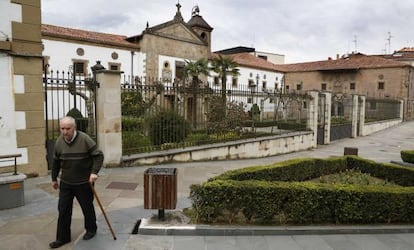Fake Honduran priest swindles nuns with promise of new recruits
Twenty-year old brought four women from his country to a nunnery in Spain

Franklin Jeovany Torres Torres is a trickster of the cloth. This extremely devout Honduran man claims to be a priest. In 2007, when he was just 20, he crisscrossed the Basque province of Gipuzkoa, knocking on the doors of convents to sell a dream: young novices from Honduras who wanted to come to Spain to continue the mission entrusted to the few elderly women who still dwell in these cloistered, semi-abandoned nunneries.
Dressed in his priest’s robe, Torres managed to convince the sisters of the Santa Brígida convent in Lasarte that the immediate future of the nunnery, built in 1675, was guaranteed.
The National Police arrested the phony priest in early March in San Sebastián, accusing him of fraud, aiding illegal immigration and infringing immigration laws.
There was a commission on the dreams. Torres extracted 13,000 euros from the Spanish nuns with the promise of new novices and 230,000 lempiras (around 9,000 euros) from a convent in the southeast of Honduras, Misioneras de Nuestra Señora de la Presentación de Intibucá.
At the church of San Pedro in Lasarte, Xabier Andonegi is officiating Mass. From the altar he can see the pews where the nuns of Santa Brígida sit. He knows all four of them. The oldest one is 95 and suffers from dementia, he says, while the youngest is 85. So the priest was surprised to see four young nuns sitting there one day in March 2008. He had never seen them before. After Mass, he came over and for the first time heard about Torres.
The fake priest had asked the Spanish nuns for financial help to bring the Honduran sisters over, at the price of 500 euros per novice. Torres returned to Honduras and suddenly changed the terms of the agreement, demanding between 1,300 and 1,500 euros per nun “alleging that the recent government change in Honduras had raised taxes,” according to the police.
The 12 Honduran novices were meant to have arrived in Spain in January 2008. In the end, only four young women showed up in March. They were wearing nun’s habits that Torres had bought for them. The fake priest had trained them for a month to act and speak like nuns.
But Andonegi, the local priest, did not take long to discover the fraud. After just one meeting with the alleged novices, he discovered that they were at the convent “to learn for a while, then look for a job.”
A simple e-mail to the Archbishopric in Honduras was enough to confirm that Torres was never ordained and that this was not the first time he had tried such a trick.
“How wonderful, how wonderful!” exclaims Sister Nolvicia, a member of the congregation of Misioneras de Nuestra Señora de la Presentación de Intibucá in Honduras, when she hears over the phone that Torres has been arrested in Spain.
She explains that he “demanded money from us to support the sisters in Spain.” He called them “loans” but the money was never returned. No novice ever left their convent to go to Spain, and it was they who reported the case to the police.
The phony novices were escorted to the airport and sent back home by a Spanish priest, while Torres disappeared for a while. But he returned to Spain, unaware that he was now a wanted man, and walked right into a police station because he wanted to obtain residency papers. He was arrested, but “still claims that he is a man of the cloth,” says the police.
Tu suscripción se está usando en otro dispositivo
¿Quieres añadir otro usuario a tu suscripción?
Si continúas leyendo en este dispositivo, no se podrá leer en el otro.
FlechaTu suscripción se está usando en otro dispositivo y solo puedes acceder a EL PAÍS desde un dispositivo a la vez.
Si quieres compartir tu cuenta, cambia tu suscripción a la modalidad Premium, así podrás añadir otro usuario. Cada uno accederá con su propia cuenta de email, lo que os permitirá personalizar vuestra experiencia en EL PAÍS.
¿Tienes una suscripción de empresa? Accede aquí para contratar más cuentas.
En el caso de no saber quién está usando tu cuenta, te recomendamos cambiar tu contraseña aquí.
Si decides continuar compartiendo tu cuenta, este mensaje se mostrará en tu dispositivo y en el de la otra persona que está usando tu cuenta de forma indefinida, afectando a tu experiencia de lectura. Puedes consultar aquí los términos y condiciones de la suscripción digital.








































